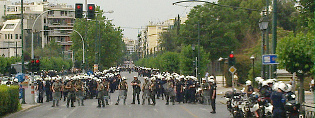
Greece (MNN) — Protests over government budget cuts grew
violent Wednesday during a national strike in Greece.
The strike has brought public services to a grinding halt
and kept most transportation at a standstill. Paul Jenks with AMG International explains that "many came out to try to
prevent the Parliament from going ahead with the decision to agree to a new
austerity movement by the government to be able to meet the demands of the IMF,
the European Central Bank and the European Union."
Police used tear gas to quell the tens of thousands of angry
Greeks. It's rumored that a cabinet
reshuffling, starting with the resignation of the Prime Minister, could pave
the way for a unity government as the ranks of the unemployed swelled this
week.
Seven days ago, the Cabinet approved a tough five-year plan
that called for 78 billion Euros in cuts. "The primary parts of this austerity movement," Jenks says, "will be to privatize those
enterprises in health care, education and all the utilities." The proposal will mean tax hikes and deep
slashing of public sector wages and benefits.
Greece's credit rating has been downgraded three times and
risks default on the debt. Bailouts mean
that every man, woman, and child in Greece is indebted $25,000. He says the shock quickly gave way to outrage.
"This is a very volatile time. The Greek people have to come to grips with the reality
that they've been overspending their capacity since 2004, and it's time now to pay off this
debt."
AMG's St. Luke's Hospital in Thessalonica is fighting to
stay alive. "The insurance companies are
not paying claims on those who are going to the hospitals. There are several
government-backed insurance companies, some are even poorer at it than
others. St. Luke's has been in a cash
flow crunch situation for the last year."
Privatizing health care may worsen an immediate crisis for
the ministry. Jenks explains, "We've had to cut salaries of the staff there
by about 7%. Some of the insurance companies were just refusing
their insured clients because they basically made no payments. We're cutting
back where we can, trying to bring the hospital in line with the reduced income
that we do have."
Ironically, there is a bright side to the story, and it can
be seen with a shift in perspective. "With all the upheaval in northern Africa,
Egypt, Libya, and other countries, places
like Greece that at first appearance are in bad shape are actually places of
refuge for people in northern Africa."
Doors are opening for outreach to the refugees fleeing the
crackdowns across North Africa. Jenks clarifies,
"There are opportunities in times of crisis for the hope that we have in Jesus
Christ to be proclaimed, perhaps even with a louder voice and with greater
clarity than when times are good."
The AMG medical team has this thought at the forefront when
faced with crippling economic troubles: "When
people come for care, they not only need physical healing, but they often need
spiritual and emotional healing. We as Christians, with the hope that we have
in Jesus Christ, minister in that way."
You can support this team even as turmoil promises to
increase in the months ahead. There are
links to their medical projects here.

